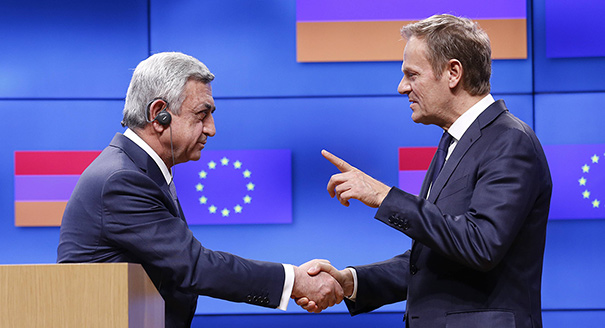Campaigns are officially underway for Armenia’s April 2 parliamentary elections, which may turn out to be the most important in recent memory: the vote will initiate the first stage of a constitutional reform that will turn Armenia’s semi-presidential system into a parliamentary one. As a result, the ruling party (and the coalition it controls) will receive most executive powers, rendering the presidential post purely symbolic.
The introduction of the changes coincides with the end of President Serzh Sargsyan’s second term. Sargsyan brought up the question of constitutional reform back in September 2013, after facing unexpectedly tough competition in the presidential election that year: the challenge got Sargsyan’s team thinking about how to maintain power in the future, and they settled on changing the constitution.
Yerevan’s ruling elite couldn’t risk U.S. and EU disapproval of constitutional changes extending Sargsyan’s current term or allowing him to serve a third term, so they chose to transition to a parliamentary model in order to remain in power. As a result, if Sargsyan’s ruling Republican Party wins the majority of seats in parliament, it will have the power to determine the country’s domestic and international policies.
But the upcoming elections aren’t just about the shift from a presidential to a parliamentary model and the intrigue surrounding President Serzh Sargsyan’s potential future as prime minister. Armenia’s international allegiances are also up for grabs: going forward, the parliament will have a much greater role in formulating the country’s foreign policy. Will it remain committed to strategic partnership with Russia? After all, opposition politicians in parliament disagree with the current government’s foreign policy, believing it to be too pro-Moscow.
Armenian political life is still extremely diverse; it can’t be reduced to simple “regime/opposition” or “pro-Russian/anti-Russian” dichotomies. Almost every political party participating in the election boasts former ministers and speakers of parliament, and one can even claim an ex-president—to say nothing of the politicians and businessmen who have been members of both the ruling coalition and the opposition at different times.
Sargsyan’s Republican Party is likely to emerge victorious in the parliamentary elections: at this point, the opposition is neither cohesive nor well-financed enough to repeat the Georgian Dream’s 2012 success. Because of the lack of discernible opposition parties, the Republican Party is using April’s elections as an opportunity to introduce new leaders to voters. Defense Minister and former presidential chief of staff Vigen Sargsyan, who is seen as the brightest star among the new generation of Armenian political elites, tops the party’s list.
The Dashnaktsutyun Party, Armenia’s oldest, may join the Republican Party’s coalition. Although there are some similarities between the two parties, it would be wrong to consider them one and the same: Dashnaktsutyun, which has participated in government coalitions in the past, has traditionally criticized the regime for its “unpatriotic policies”—attempts at rapprochement with Turkey, for instance. This particular issue shouldn’t be a concern for the time being, however, since relations between Yerevan and Ankara are currently deadlocked.
The Armenian opposition is traditionally divided into several factions: the Tsarukyan and Yelk blocs, and the coalition consisting of the Armenian National Congress (ANC) and the People’s Party of Armenia. These opposition parties are not always in the opposition, however: Gagic Tsarukyan’s Prosperous Armenia Party has participated in government coalitions in the past and may do so again after next month’s elections.
By contrast, a coalition consisting of Yelk, the Free Democrats, the ANC, and the People’s Party has another agenda: it seeks to change the existing system and is therefore unlikely to be willing to share power with the Republican Party. But these opposition forces have never been able to consolidate their efforts, and this inability will likely continue to plague them after the elections.
In addition to conflicts between parties and their leaders, Armenian opposition parties also have plenty of strife within their ranks. The Ohanyan-Raffi-Oskanyan bloc that bears the names of former defense minister Seyran Ohanyan and former foreign ministers Vardan Oskanyan and Raffi Hovannisian is a case in point.
The resolution of the Nagorno-Karabakh conflict is another serious issue. All political forces generally agree that a resolution is necessary but differ over how to bring it about. For example, the ANC and People’s Party coalition, headed by Levon Ter-Petrosyan, Armenia’s first president, actively promotes compromise and takes a realistic view of how to reach a peace agreement, but is accused of being willing to make unilateral concessions by its detractors.
Russian media like to perpetuate narratives about Armenia’s pro-Russian regime and the pro-Western opposition. In reality, this “pro-Russian regime” is actively promoting a framework agreement with the EU, which can be seen as a scaled-down version of an association agreement. The Sargsyan team is interested in developing the European and American vectors of Armenian foreign policy to prevent Azerbaijan from having a monopoly on relations with Washington and Brussels.
And the opposition is not always anti-Russian, either: Ter-Petrosyan, who is considered a pro-Western politician, described Georgia’s behavior in South Ossetia as “genocide.” There is no question that the Yelk bloc has been consistent in criticizing the current government for its pro-Russian bent, but even its leaders don’t completely oppose Russian involvement in Armenia.
Thus, Armenian parliamentary elections will also be a test for Russia. Moscow is facing a difficult choice between supporting some opposition politicians and simply throwing its weight behind the ruling party. Choosing the second option could pit Russia against Armenians who don’t support the regime. This is a dangerous path that could lead Armenian society to associate all of the country’s external problems with Russia.
